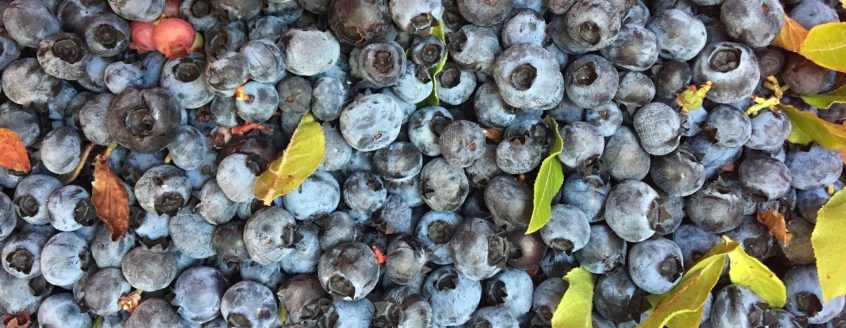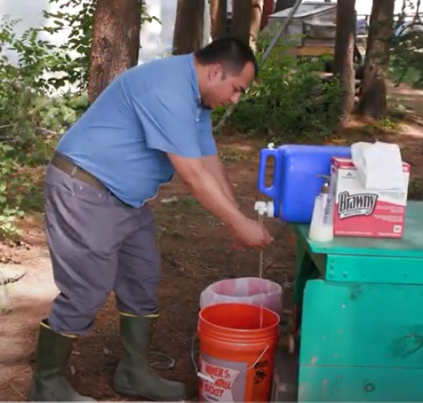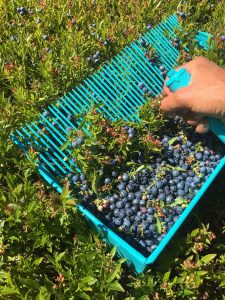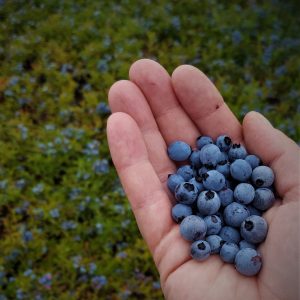Rake Your Own Wild Blueberries

Prepared by Lily Calderwood, PhD, Extension Wild Blueberry Specialist and Brogan Tooley, Research Assistant. 2020
- General Sanitation Regulations
- Must-Haves & Considerations
- Sanitations Related Costs
- Resources
Agritourism is a growing aspect of Maine farms that brings consumers closer to where their food is grown. This type of value-added diversification takes place in the form of ‘direct market’ (farm-stands and pick-your-own), ‘education’ (field days and farm-stays), and ‘recreation’ (event-hosting and activities). Any way you decide to invite people to your farm, it can be community building and a great marketing tactic. Here you will find some general guidelines, considerations, and resources for pick-your-own (PYO) and other agritourism approaches that may bring guests to your farm.
While there are many things to consider in order to provide an efficient, safe, and comfortable place where visitors would like to spend their time, there are also some ‘must haves’ set forth by the FDA to ensure good food safety practices. These ‘must haves’ include protocols and rules established by the farm to ensure guests are practicing proper sanitation and proper food safety (i.e. washing foods prior to consumption or not bringing pets into the field). For agritourism checklists and pre-made signs that can be printed and posted around your farm, please visit: https://safeagritourism.org/resources/.
FDA Guidelines
Title 21 of the Code of Federal Regulations, Chapter 1B, Part 112D Health and Hygiene, Section 112.33 “What measures must I take to prevent visitors from contaminating covered produce and food contact surfaces with microorganisms of public health significance?” states:
- Visitors must be aware of and comply with policies and procedures designed to protect produce and food contact surfaces from contamination.
- Visitors must have access to toilet and handwashing facilities.
Whole document: https://www.accessdata.fda.gov/scripts/cdrh/cfdocs/cfCFR/CFRSearch.cfm?fr=112.33
Meeting these guidelines at a field near a farm building would be easier than attempting to do rake-your-own at a more remote wild blueberry field. Renting a portable toilet during the months of picking may be the best option for wild blueberry growers as the picking location will change yearly with the crop cycle. Portable toilet rentals cost between $100-$250 per month (see the local cost analysis table below). Renting this facility will ensure it will be cleaned regularly allowing the grower to focus on other farm tasks. Hand washing stations may be rented or homemade. If handwashing stations are homemade, these would require an adequate amount of clean water and soap replenished throughout the season. While hand sanitizer cannot replace handwashing, it is a good and recommended option in addition to handwashing, see the Produce Safety Alliance; guide to Cleaning vs. Sanitizing.
Legal action has been taken in Maine to protect the grower and farm when allowing and hosting agritourism activities. Enacted in 2012, Chapter 8-E of Maine Public Law was designed to promote agritourism activities and reduce liability on the grower or farm.
Maine Law
Public Law, Chapter 609, Sec. 1. 7 MRSA c. 8-E, Promotes Agricultural Activity in Maine by Limiting the Liability for Agritourism Activities. This states:
“An agritourism professional is not liable for any property damage or damages arising from the personal injury of a participant resulting from the inherent risks of agritourism activities”
There is an exception, however, if the agritourism professional is at fault. If the agritourism professional:
- “Commits an act or omission that constitutes negligence or reckless disregard for the safety of others, and that act or omission causes an injury.”
- “Had knowledge of dangerous conditional or intentionally injures a participant.”
Whole document: http://www.mainelegislature.org/legis/bills/bills_125th/chapters/PUBLIC609.asp
Rake Your Own > Must-Haves & Considerations
MUST-HAVES
- Parking – Do you have adequate room for visitors to park safely without blocking one another in?
- Place to Pay – How will visitors pay you for what they rake?
- Restrooms – Visitors will need a clean, accessible and well signed restroom.
- Handwashing – Visitors will need to be able to wash hands after using the restroom and prior to picking, this may require handwashing stations in multiple locations.
- Trash receptacles – Sturdy trash cans placed near parking, restrooms and handwashing will reduce the potential for trash contamination in your field.
CONSIDERATIONS
- Advertisement – How will the public hear about your farm?
- PYO farms are listed on various websites: http://www.theheartofnewengland.com/backporch-MaineBlueberries.html
https://www.visit-maine.com/state/pick-your-own-farms/
https://www.getrealmaine.com/Food-Farms-and-Forest-Search
https://www.pickyourown.org/ME.htm
- Disclosing any and all accommodations is a marketing strategy!
- Accessible Information – What do visitors need to know, prior to arriving?
- Where do you want people to go? We recommend selecting an area of a field for public raking or rake-your-own. Clear directions to the farm and exact PYO location are essential.
- Do they need to bring their own rakes or pick by hand?
- Will someone teach visitors how to rake?
- Will visitors winnow their own berries?
- Do they need to bring their own containers?
- When they get sick of raking… can they buy a ready to go pint of berries?
- What are your prices? Where and how are they expected to pay?
- Where is the bathroom?
- Coronavirus Prevention – Will visitors and staff be able to meet current CDC guidelines?
- Is there proper sanitation?
- Can visitors stay 6ft apart from each other at all times?
- Will your guidelines/requirements be accessible to visitors prior to arriving?
- Will you have a curb-side pick up option?
- Food Safety – We recommend detailed signs and guidelines encouraging food safe practices.
- Will guests be required to wash their hands prior to raking? Where will people walk in the field?
- Prevention of raking in heavily trafficked area.
- Liability insurance – NOT Required but Encouraged.
- Accessibility to Seating and Shade – Wild blueberry fields can be very hot and dry in the summer.
- Accessible picnic tables or benches ensure a safe place to rest.
- Shade allows guests to get a break from the summer sun.
- Signs – Sign content and placement is key! Premade signs Here: https://safeagritourism.org/resources/
- Signs should start out on the main road – leading visitors to the parking area.
- At entrance to the field – this where farm rules and guidelines should be placed.
- Food safety – hand washing, food washing, etc.
- Field safety – hydration, bees, etc.
- How and where to rake.
- How and where to pay.
- At restrooms – additional signs for handwashing and food safety are encouraged.
Hand Washing Stations can be HOMEMADE!!!
All you need is:
- 5-gallon jug of clean water
- Bucket to catch wastewater
- Bucket or can for trash
- Soap
- Disposable paper towel
Local Portable Toilet Rental Estimates 2020
| Company | Region | Contact | Units Basic (B) Handicap (H) $/Month |
Handwashing $/Month |
| Lincoln/Bangor Portable Toilet Rentals | Mid Coast and Central ME |
Nancy Page (207) 794-8687 |
$100 (B) $140 (H) |
Hand Sanitizer Inc. or Add $25/Month |
| Moore’s Septic | Mid Coast | (207) 338-4586 | $100 (B) $200 (H) |
Hand Sanitizer Inc. |
| Ray Plumbing and Heating | Down East (Ellsworth region) | Resa & Danny Ray (207) 667-5536 | $120 (B) $250 (H) |
Hand Sanitizer Inc. Hand wash station $105/Month |
| Other Companies | Average Ranges: | $100-120 (B) $140-250 (H) |
$105 | |
Helpful Rake Your Own Links
Maine-Specific
Maine Cooperative Extension – Best management practices for U-Pick Farms During COVID-19
Maine Agri-Tourism, Department of Agriculture, Conservation and Forestry
Maine Legislature on Agritourism Activities and Liability
Article on Maine Agritourism Liability Protection Act (ISU)
Pick you own (general crops), Maine locations
COVID-Specific
DACF Guidance for Pick-Your-Own Operations
FDA Summary of Best Practices for Food Pick-Up/Delivery Services During the COVID-19 Pandemic
Cornell Best Practices for U-Pick Farms During the COVID-19 Pandemic
Produce Safety Alliance; Cleaning vs. Sanitizing
Produce Safety Alliance; EPA Labeled Sanitizer
Maine Registered Disinfectants for Use Against Covid-19
Recorded Zoom Discussion on Best Management Practices for U-Pick Operations during COVID-19



